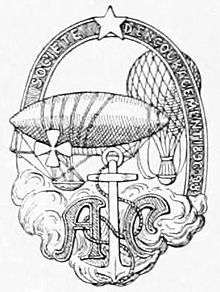Aéro-Club de France

The Aéro-Club de France was founded as the Aéro-Club on 20 October 1898 as a society 'to encourage aerial locomotion' by Ernest Archdeacon, Léon Serpollet, Henri de la Valette, Jules Verne and his wife, André Michelin, Albert de Dion, Alberto Santos-Dumont, Henry Deutsch de la Meurthe, and Henry de La Vaulx.[1] On 20 April 1909 its name was changed to Aéro-Club de France.[2]
The Aéro-Club de France originally set many of the regulations that controlled aviation in France. From its formation it also set the rules that have marked some of the 'firsts' in aviation, such as the first closed-circuit flight of over 1 km and the first helicopter flight, and has organised competitions including:
- the Prix Deutsch de la Meurthe, a challenge for dirigibles from 1901
- the Gordon Bennett Cup for fixed-wing aircraft in 1909
The club published the journal L'Aérophile from 1898 to 1947,[3] and since 1997 publishes the magazine Aérofrance.
The Aéro-Club de France was a founding member of the International Aeronautical Federation (FAI) in 1905, a joint effort with other national associations.
After 1945 some of the Aéro-Club's regulatory roles were taken by other bodies. It now focusses on the promotion of aviation and certification.
Medal

The Club grants the Great Medal of the Aéro-Club de France to individuals who have made outstanding contributions to the advancement of aviation. The winners have been:
- 2006 - the flight test team of the Airbus A380 and the Dassault Falcon 7X
- 2005 - Pierre Guyoti
- 2004 - at the retirement of Concorde, the heads of EADS, British Aerospace, Air France and British Airways
- 2003 - Steve Fossett
- 2002 - the astronauts of the Andromeda mission
- 2000 - Jean-Pierre Haigneré, ESA astronaut
- 1998 - Bertrand Piccard, of the Breitling Orbiter 3 balloon
- 1997 - Claudie Haigneré, Shannon Lucid, Yelena Kondakova
- 1996 - Jules Roy the author
- 1995 - Serge Dassault
- 1994 - Henri Pescarolo
- 1988 - Jean Salis, Chuck Yeager
- 1986 - Patrick Baudry
- 1981 - John Young, Robert Crippen
- 1970 - Jim Lovell, Jack Swigert, Fred Haise
- 1969 - Neil Armstrong, Buzz Aldrin, Michael Collins
- 1967 - Adrienne Bolland, Elisabeth Boselli, Marcel Dassault, Didier Daurat, Jean Lasserre, Georges Libert, Henry Potez
- 1963 - Jacqueline Auriol
- 1958 - Gabriel Voisin
- 1938 - Henri Guillaumet, Paul Tissandier
- 1931 - Maurice Noguès
- 1930 - Jean Mermoz, Maurice Bellonte
- 1928 - Joseph Le Brix
- 1927 - Charles Lindbergh
- 1923 - Louis Bréguet, Pierre-Georges Latécoère, Dieudonné Costes
- 1922 - Clément Ader
- 1920 - Joseph Sadi-Lecointe
- 1917 - Warrant Officer Lucien Jailles, Sergeant Walter Lowell, Warrant Officer Raoul Lufbery, Archibald Johnson, Willis Haviland, Captain Georges Thenault, Warrant Officer Harold Willis, Second Lieutenant Henri Languedoc, Lieutenant J.A. Tourtay, Second Lieutenant Hector Varlin, American Second Lieutenant William Thaw, Lieutenant Albert Dulllin, Captains Alfred Heurtaux and Georges Guynemer, Second Lieutenant Paul Tarascon, Captain André Wateau
- 1912 - Roland Garros
- 1911 - Jules Védrines
- 1910 - Géo Chavez
- 1909 - Louis Blériot
- 1908 - Henri Farman, Wilbur Wright, Orville Wright
- 1901 - Alberto Santos-Dumont, Henri Deutsch de la Meurthe, Robert Lebaudy
- 1900 - Henry de La Vaulx
See also
- List of pilots awarded an Aviator's Certificate by the Aéro-Club de France in 1909
- List of pilots awarded an Aviator's Certificate by the Aéro-Club de France in 1911
References
- ↑ "Historique" (in French). Aéro-Club de France. Retrieved 17 April 2014.
- ↑ "Centenaire De L Aero-Club De France". Aviation-francaise.com. Retrieved 2012-08-07.
- ↑